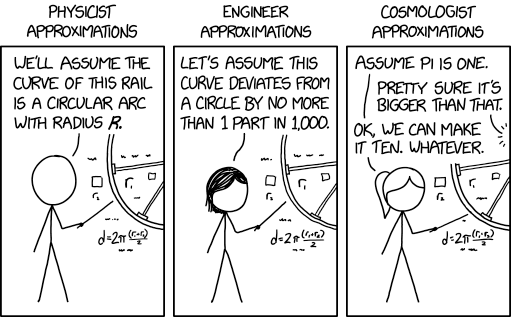2205: Types of Approximation
| Types of Approximation |
 Title text: It's not my fault I haven't had a chance to measure the curvature of this particular universe. |
Explanation
| |
This explanation may be incomplete or incorrect: Created by a BOT. Please mention here why this explanation isn't complete. Do NOT delete this tag too soon. If you can address this issue, please edit the page! Thanks. |
Transcript
| |
This transcript is incomplete. Please help editing it! Thanks. |
Discussion
The cosmologist is probably using Fermi's a la What-If 84: Paint the EarthOhFFS (talk) 20:34, 20 September 2019 (UTC)
- In that What-If, the rounding formula for Fermi problem estimation is given as "Fermi(x) = round10(log10(x))". log10(pi) (Google search, shows calculator) is roughly .4971... so close enough that someone could do a "Fermi rounding" to either 1 or 10 and not really care one way or another. 162.158.142.118 21:19, 20 September 2019 (UTC)
As a physics Phd (though not working in astrophysics), approximating pi to 1 is not all that bad. Especially when the measurable quantities that go into the calculation usually have huge error bars.--172.68.59.120 21:03, 20 September 2019 (UTC)
Using natural units (setting c=hbar=1) is different from setting pi to 1. Using different units is always allowed and not an approximation. Setting pi to 1 on the other hand, is an approximation and is only justifiable if the other quantities in the calculation have huge uncertainty. --172.68.59.120 21:07, 20 September 2019 (UTC)
